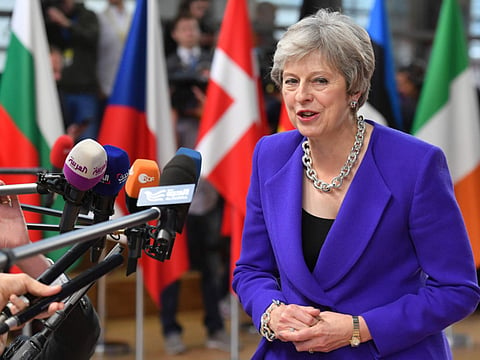A stumbling block to Brexit deal
Any chance of a Brexit deal relies on reaching an agreement on the Irish border. And the DUP has no interest in any compromise at any cost.

There is but one word that matters in the political vocabulary of the Democratic Unionist Party (DUP) of Northern Ireland. No.
It is the word that defines its being, its philosophy, its outlook on life, its thinking.
No compromise. No leeway. No surrender. No. This is the party that has 10 Members of Parliament at Westminster.
Because of Prime Minister Theresa May’s pigheaded arrogance in believing that only she could bring about a Brexit agreement, she decided to call a general election in June 2017, even though there was no need and her Conservative party had a comfortable overall majority.
Because of that, the DUP is now propping up her Conservative party government in a confidence and supply arrangement. A £1 billion (Dh4.84 billion) financial inducement to Northern Ireland’s public coffers also helped. But now the true price of her Faustian deal with the DUP is clear.
No special treatment for Northern Ireland.
No customs checks on goods leaving the island of Ireland at ports on the mainland of Britain. No border down the Irish Sea.
No compromise. No leeway. No surrender. No.
It’s not as if Prime Minister May didn’t have plenty of warning of the obdurate nature of the DUP and its single-word agenda. The fact is she was given an early example of its single-mindedness just five months into the confidence and supply arrangement, when it looked in December as if the Brexit talks would collapse without even having reached those first-phase goals.
The DUP said no to keeping the north aligned with the south on customs arrangements, and instead committed the whole UK to maintaining “regulatory alignment” with the EU.
As unionists, the DUP believe that Northern Ireland is an intrinsic part of the UK, that it is equal in every way, and its sole raison d’etre is to maintain that union.
And there is a majority too who believe — and voted — for Northern Ireland to remain in the European Union. No, the DUP said then, it shouldn’t, and they were loud supporters of Brexit.
The fact is that at every occasion since the very day it was founded by the Reverend Ian Paisley in 1971, the DUP has opposed any and every move that might bring about a united Ireland — or even efforts that might have brought peace to a province ripped asunder by three decades of political and sectarian violence.
That violence evolved from a civil rights movement 50 years ago this month, because the Unionist majority that ruled Northern Ireland said no to giving equal rights to the nationalist and Roman Catholic minority who wanted equal access to housing, jobs and opportunities.
Then there was the 1985 Anglo-Irish Treaty, which was signed between then PM Margaret Thatcher and Taoiseach Garrett FitzGerald of Ireland.
No, the DUP said. The violence continued.
And then there was the Good Friday Agreement, signed in April, 1985. It called for an elected assembly, a power-sharing executive, cross-border cooperation and decommissioning of all weapons of the dark forces of terrorism and those paramilitary thugs on both sides of the community divide. No, the DUP said. The violence did continue for a while, but peace was allowed to take root.
Over the past two decades, that physical border has been removed, and driving between north and south is no different than driving from Abu Dhabi to Dubai. The road surface changes a little, the road signs switch to kilometres per hour and become bilingual in English and Gaelic. That’s it.
And still the DUP says no.



